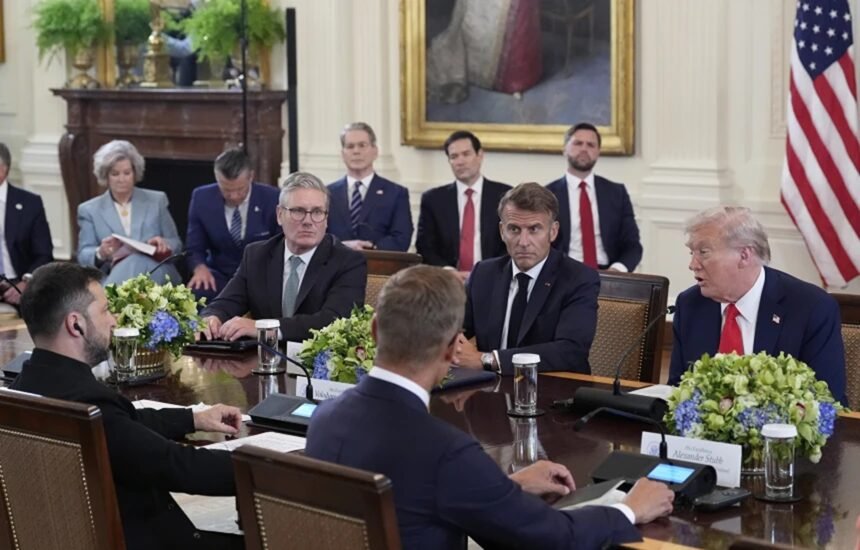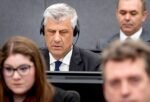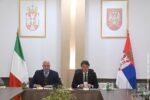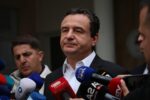European leaders have joined Ukrainian President Volodymyr Zelensky in insisting that any talks to end the war in Ukraine must begin with a freeze of the current front line. They also warned that Russia does not take peace seriously.
In a statement signed by 11 leaders, including UK Prime Minister Keir Starmer, they expressed strong support for US President Donald Trump’s position that “fighting must stop immediately and the current line of contact should be the starting point for negotiations.”
However, Russian Foreign Minister Sergei Lavrov on Tuesday rejected the idea of halting conflict along the current line of contact.
Moscow has stated that it is only interested in a “long-term and sustainable peace,” implying that freezing the front line would merely constitute a temporary ceasefire.
The European statement referred to “Russia’s delaying tactics,” highlighting the persistent stance of Moscow.
Trump, who has often taken a conciliatory tone toward Russia, is now planning direct talks with Putin in Budapest, although a preparatory meeting between US Secretary of State Marco Rubio and Lavrov appears to have been delayed.
The US president spoke with Putin by phone last week, one day before meeting Zelensky and his team at the White House.
According to some sources, Trump pressured Ukrainian leaders to cede large territories in the eastern Donetsk and Luhansk regions, known as Donbas, as part of a potential agreement with Russia. Some reports suggested tensions between the delegations, but Zelensky described the talks as “sincere.”
The Ukrainian president has frequently rejected territorial concessions, arguing that Russia could use them as a springboard for future attacks.
“I explained during my visit to Washington last week that Ukraine’s position has not changed,” he said on Monday.
Although Russia occupies most of Luhansk, Ukraine retains control over roughly a quarter of Donetsk, including the key cities of Slovyansk and Kramatorsk.
Trump, who later denied ever insisting that Zelensky surrender Donbas, expressed support for the idea of a ceasefire along the current front lines.
“Let it stop where it is,” he said on Monday, referring to the contested region.
“It’s fragmented now. I think 78% of the land is already under Russian control… I said: stop at the line of battle. Go home. Stop fighting, stop killing people.”
Yet Moscow continues to reject discussions to freeze the front line.
Kremlin spokesman Dmitry Peskov said the idea has been repeatedly presented to the Russians, but “the steadfastness of Russia’s position does not change,” referring to Moscow’s insistence on the full withdrawal of Ukrainian forces from the contested eastern regions.
“The root causes of the conflict must be addressed,” Lavrov said on Tuesday, outlining a set of maximalist Russian demands, including recognition of full Russian sovereignty over Donbas and the demilitarization of Ukraine—positions unacceptable to Kyiv and its European partners.
A potential Trump-Putin meeting in Hungary would require at least one EU country to open its airspace for the Russian leader’s plane. Putin is subject to an international arrest warrant for war crimes, and both Poland and Lithuania have indicated they would enforce it if he flew through their territories.
Another possible route to Budapest for Putin could be through Bulgarian airspace. Foreign Minister Georg Georgiev suggested Bulgaria would be willing to allow the plane to pass.
“When efforts are made for peace, it is logical that all parties contribute to making such a meeting possible,” he said.
Trump and Putin last met in Alaska in August at a hastily organized summit, which yielded few results but ended Putin’s status as a pariah in the West.
Following these talks, Trump proposed the idea of a bilateral summit between Putin and Zelensky.
However, Russia insisted that such a meeting depended on addressing the “root causes” of the war first, and the idea was quietly dismissed by all parties.
Since beginning his second term, Trump has expressed that the Russo-Ukrainian war, now in its fourth year, is “difficult” to resolve.







